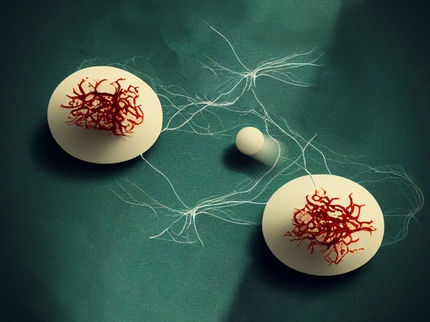Texas A&M team finds neuron responsible for alcoholism
Scientists have pinpointed a population of neurons in the brain that influences whether one drink leads to two, which could ultimately lead to a cure for alcoholism and other addictions.
A study, published in the Journal of Neuroscience by researchers at the Texas A&M Health Science Center College of Medicine, finds that alcohol consumption alters the structure and function of neurons in the dorsomedial striatum, a part of the brain known to be important in goal-driven behaviors. The findings could be an important step toward creation of a drug to combat alcoholism.
"Alcoholism is a very common disease," said Jun Wang, M.D., Ph.D., the lead author on the paper and an assistant professor in the Department of Neuroscience and Experimental Therapeutics at the Texas A&M College of Medicine, "but the mechanism is not understood very well."
Now, Wang and his team have helped come a little closer to that understanding. Using an animal model, the researchers determined that alcohol actually changes the physical structure of medium spiny neurons, the main type of cell in the striatum. They each have one of two types of dopamine receptors, D1 or D2, and so can be thought of as either D1 or D2 neurons. D1 neurons are informally called part of a "go" pathway in the brain, while D2 neurons are in the "no-go" pathway. In other words, when D2 neurons are activated, they discourage action.
Although it is well known that the neurotransmitter dopamine is involved in addiction, this study goes further, showing that the dopamine D1 receptor also plays an important role in addiction. The team found that periodic consumption of large amounts of alcohol acts on D1 neurons, making them much more excitable, which means that they activate with less stimulation.
"If these neurons are excited, you will want to drink alcohol," Wang said. "You'll have a craving." That is to say, when neurons with D1 receptors are activated, they compel you to perform an action. This then creates a cycle, where drinking causes easier activation, and activation causes more drinking.
These changes in activation of D1 neurons might be related to the physical changes happening at the sub-cellular level in brains that have been exposed to alcohol. They have longer branching and more of the mature, mushroom-shaped spines - the type that stores long-term memories - than their abstaining counterparts.
Conversely, the placebo group, the ones not exposed to alcohol, tended to have more of the immature versions of the mushroom-shaped spines in D1 neurons of their brains. The total number of spines didn't change in the two groups, but the ratio between mature and immature was dramatically different between the alcohol group and the placebo group. This has important implications for memory and learning in drug addiction.
Organizations
Other news from the department science

Get the life science industry in your inbox
By submitting this form you agree that LUMITOS AG will send you the newsletter(s) selected above by email. Your data will not be passed on to third parties. Your data will be stored and processed in accordance with our data protection regulations. LUMITOS may contact you by email for the purpose of advertising or market and opinion surveys. You can revoke your consent at any time without giving reasons to LUMITOS AG, Ernst-Augustin-Str. 2, 12489 Berlin, Germany or by e-mail at revoke@lumitos.com with effect for the future. In addition, each email contains a link to unsubscribe from the corresponding newsletter.




















































